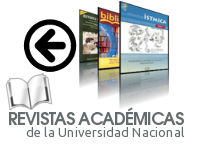Descrição social ou análise socio-científica? O exegeta e o temor para decidir.
DOI:
https://doi.org/10.15359/siwo.14-1.2Palavras-chave:
Exegese, descrição social, análise socio-científico, evangelhos sinóticos, relatos de milagre e exorcismosResumo
O artigo descreve o problema apresentado por alguns exegetas que separa os estudos socio-científicos no trabalho exegético pelo perigo de implicar elementos alheios aos textos mesmos. Apresenta um exemplo de cada um de ambos os métodos em discussão: a descrição social e a análise sociocientífica e se conclui com algumas observações para orientar uma decisão razoável. É um artigo para descrever o problema e tem um objetivo pedagógico na área da teologia e a exegese.
Referências
Barton, Stephen C. 2002. “Social-Scientific Criticism”, Handbook to the exegesis of the New Testament. Bellingham, WA: Logos Research Systems.
Bohak, Gideon. 2017. “Conceptualizing Demons in Late Antique Judaism”. Bhayro, Siam, and Catherine Rider. Demons and illness from antiquity to the early-modern period. 111-133. Leiden: Brill.
Costa, Tony. 2013 “The exorcisms and healings of Jesus within classical culture”. Porter, Stanley E. Early Christianity in its Hellenistic context. Volume 1: Christian origins and Greco-Roman culture. Social and literary contexts for the New Testament. Leiden: Brill.
Crook, Zeba. 2020. The ancient Mediterranean Social World. Grand Rapids: Wm. B. Eerdmans Publishing Co.
Chapa, Juan. 2002. “Exorcistas y exorcismos en tiempos de Jesús”. Aguirre Monasterio, Rafael. Los milagros de Jesús: perspectivas metodológicas plurales, Estella: Verbo Divino.
García Martínez, Florentino. 1993. Textos de Qumrán. España: Trotta.
Guijarro Oporto, Santiago. 2002. “Relatos de Sanidad y antropología médica”. Aguirre Monasterio, Rafael. Los milagros de Jesús: perspectivas metodológicas plurales, Estella: Verbo Divino.
Esler, Philip. 2009. Social-Scientific Approaches. En Porter, Stanley E. Dictionary of biblical criticism and interpretation. 337-340. London: Routledge.
Harris, William Vernon. 2014. Rethinking the Mediterranean. Oxford: Oxford University Press.
Malina, Bruce J. 1995. El mundo del Nuevo Testamento: perspectivas desde la antropología cultural. Estella [Navarra]: Verbo Divino.
Malina, Bruce J., Richard L. Rohrbaugh, and Víctor Morla Asensio. 1996. Los Evangelios sinópticos y la cultura mediterránea del siglo I: comentario desde las ciencias sociales. Estella (Navarra): Verbo Divino.
Malina, Bruce J., and John J. Pilch. 2000. Handbook of biblical social values. Peabody, Massachusetts: Hendrickson Publishers.
Malina, Bruce J. 2002. El mundo social de Jesús y los evangelios: la antropologia cultural mediterránea y el Nuevo Testamento. Santander: Editorial Sal Terrae.
Malina, Bruce J. 2002. “Exegetical Eschatology, the Peasant Present and the Final Discourse Genre: The Case of Mark 13”. Biblical Theology Bulletin: A Journal of Bible and Theology. 32 (2): 49-59.
Meeks, Wayne Atherton. 1988. Los primeros cristianos: el mundo social del apóstol Pablo. Salamanca: Ediciones Sígueme.
Miquel Pericás, Esther. 2011. El Nuevo Testamento desde las ciencias sociales. Estella: Verbo Divino.
Porter, Stanley E., and Stanley E. Porter. 2003. Handbook to the exegesis of the New Testament. Bellingham, WA: Logos Research Systems.
Porter, Stanley E. 2013. Christian origins and greco-roman culture: social and literary contexts for the New Testament. Leiden: Brill.
Theissen, Gerd. 1985. Estudios de sociología del cristianismo primitivo. Salamanca: Sígueme.
Theissen, Gerd. 2008. “Exégesis sociohistórica desde los comienzos de la investigación histórico-crítica hasta la antropología cultural”, en Bernabé Ubieta, Carmen, Gil Arbiol, Carlos. (eds), Reimaginando los orígenes del cristianismo: relevancia social y eclesial de los estudios sobre orígenes del cristianismo: libro homenaje a Rafael Aguirre en su 65 cumpleaños. Estella, Navarra: EVD.
van Aarde, Andries. 2009. Methods and models in the quest for the historical Jesus: Historical criticism and/or social scientific criticism. AOSIS OpenJournals. http://www.hts.org.za/index.php/HTS/article/view/562
Publicado
Como Citar
Edição
Seção
Licença
Política propuesta para Revistas que ofrecen Acceso Abierto
Los autores que publican en esta revista están de acuerdo con los siguientes términos:
1. Esta revista provee acceso libre bajo licencia Creative Commons Reconocimiento-NoComercial CC BY - NC. Usted como persona autora conserva sus derechos de autor. Esta licencia permite que otros remezclen, adapten y desarrollen su trabajo sin fines comerciales, siempre y cuando le den crédito y licencien sus nuevas creaciones bajo los mismos términos
2. Los autores pueden establecer por separado acuerdos adicionales para la distribución no exclusiva de la versión de la obra publicada en la revista (por ejemplo, situarlo en un repositorio institucional o publicarlo en un libro), con un reconocimiento de su publicación inicial en esta revista.
3. Se permite y se anima a los autores a difundir sus trabajos electrónicamente (por ejemplo, en repositorios institucionales o en su propio sitio web) antes y durante el proceso de envío, ya que puede dar lugar a intercambios productivos, así como a una citación más temprana y mayor de los trabajos publicados (Véase The Effect of Open Access) (en inglés).











